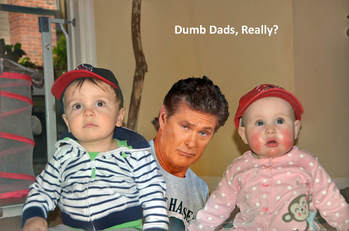
For example, there was a Verizon commercial where a dad is helping his eight-year-old daughter with a research project. The mom walks in and asks what he’s doing. As his daughter rolls her eyes, he tells the mom he’s helping their daughter with her assignment. The mom says, “Tom, leave her alone!” The tone being she’ll do better without his help. The message is clear, they are smarter than him. But here is a dad spending quality time with his daughter. Maybe that is more important than the homework at the moment.
Often in commercials, the mom is shown to be the smart one while the dad is just a goofball. No advertiser could ever get away with turning the tables -- dad’s smart, mom’s dumb. Maybe this is because women are the bigger consumers. Maybe women are more organized and have feminist groups that look out for them. A study by the National Fatherhood Initiative found that fathers are eight times more likely than mothers to be portrayed negatively on network television. Pay attention to commercials with both parents involved. Notice the treatment and roles each parent seems to have. Dad will brag while mom shows him up or mom will come to the rescue or make the right decision.
Also, look at TV shows and how dads are portrayed in the following popular programs.
- Everybody Loves Raymond
- Married With Children
- Homer Simpson
- Family Guy
- Bob’s Burgers
- Two and Half Men
Again, there are a lot of laughs in these programs. But when kids watch these shows without a balancing view of fatherhood, it leaves the impression with many children that the dad is one of the kids and mom is the only adult. While not a big deal in solid two-parent homes, it is a problem for kids that don’t have a father in the home. Boys without a dad don’t get any positive reinforcement about fatherhood and may not think much of becoming one themselves.
However, the best parenting is almost always accomplished with a balance of a mom and a dad, both respected and contributing. Dr. Meg Meeker, author of several books on parenting including Strong Fathers, Strong Daughters, has this to say about the profound impact fathers have on their children’s emotional, physical, mental and intellectual growth:
- Toddlers who are securely attached to their fathers are better at problem-solving.
- The most effective way to boost a girl’s self-esteem is for her father to give her physical affection.
- Kids who have fathers in the home are dramatically less likely to suffer from anxiety, depression and learning disorders.
- Kids with fathers at home are more likely to get better grades, graduate from high school, and go on to college and grad school.
- According to a study that looked at 90,000 kids, the number-one factor operating in teens’ lives that kept them away from sex, drugs and alcohol was “parent connectedness.” In other words, when dads were engaged with their sons and daughters, the teens were much more likely to stay away from high-risk behaviors.
- Dads, not peers, are the primary influence in a daughter’s life regarding the decisions she makes about sexual activity.
From my book, The Power of Dadhood:
Even if a man and a woman have similar values to teach their offspring, they likely have different strengths in relating to their children. Children need the diversity of ideas presented by both a mother and a father. They need a masculine and a feminine approach, a yin and a yang, different approaches and viewpoints. Differing views often complement each other.
Summary
While dads are often the jokester of the two parents, this mustn’t be construed as them being clueless. (Does Phil Dunphy come to mind?) Making fun of dad within the family is okay in the right atmosphere. But dads should be treated with due respect also. Just as in the family, there should be a balance of lightness and seriousness when portraying fathers in the media. Have fun with dads on TV and commercials but it would help if dads were also portrayed as heroes occasionally. I do believe there have been some efforts along this line thanks to Dove and other advertisers. We need more, not for the men, but for the boys who will become men and, hopefully, good dads.
#powerofdadhood





